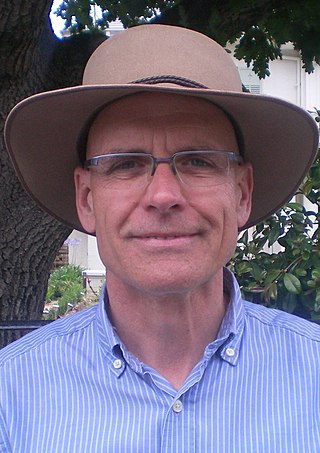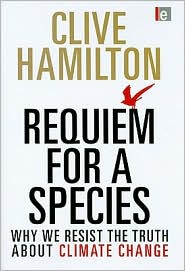
Stephen Gerald Breyer is an American lawyer and jurist who served as an associate justice of the U.S. Supreme Court from 1994 until his retirement in 2022. He was nominated by President Bill Clinton, and replaced retiring justice Harry Blackmun. Breyer was generally associated with the liberal wing of the Court. He is now the Byrne Professor of Administrative Law and Process at Harvard Law School.
A culture war is a form of cultural conflict between different social groups who struggle to politically impose their own ideology upon mainstream society.
Participatory democracy, participant democracy, participative democracy, or semi-direct democracy is a form of government in which citizens participate individually and directly in political decisions and policies that affect their lives, rather than through elected representatives. Elements of direct and representative democracy are combined in this model.

Clive Charles Hamilton AM FRSA is an Australian public intellectual currently serving as Professor of Public Ethics at the Centre for Applied Philosophy and Public Ethics (CAPPE) and the Vice-Chancellor's Chair in Public Ethics at Charles Sturt University. He is a member of the Board of the Climate Change Authority of the Australian Government, and is the Founder and former Executive Director of The Australia Institute. He regularly appears in the Australian media and contributes to public policy debates. Hamilton was granted the award of Member of the Order of Australia on 8 June 2009 for "service to public debate and policy development, particularly in the fields of climate change, sustainability and societal trends".
Media democracy is a democratic approach to media studies that advocates for the reform of mass media to strengthen public service broadcasting and develop participation in alternative media and citizen journalism in order to create a mass media system that informs and empowers all members of society and enhances democratic values.
Open-source governance is a political philosophy which advocates the application of the philosophies of the open-source and open-content movements to democratic principles to enable any interested citizen to add to the creation of policy, as with a wiki document. Legislation is democratically opened to the general citizenry, employing their collective wisdom to benefit the decision-making process and improve democracy.
In American law, the unitary executive theory is a Constitutional law theory according to which the President of the United States has sole authority over the executive branch. It is "an expansive interpretation of presidential power that aims to centralize greater control over the government in the White House". The theory often comes up in jurisprudential disagreements about the president's ability to remove employees within the executive branch; transparency and access to information; discretion over the implementation of new laws; and the ability to influence agencies' rule-making. There is disagreement about the doctrine's strength and scope, with more expansive versions of the theory becoming the focus of modern political debate. These expansive versions are controversial for both constitutional and practical reasons. Since the Reagan administration, the Supreme Court has embraced a stronger unitary executive, which has been championed primarily by its conservative justices, the Federalist Society, and the Heritage Foundation.
The Australia Institute is an Australian public policy think tank based in Canberra, with offices also in Hobart and Adelaide. Since its launch in 1994, it has carried out research on a broad range of economic, social, and environmental issues. The Australia Institute takes a bipartisan approach to research, but has been described as a "progressive" or "left-leaning" think-tank.
"Greenhouse Mafia" is the title of a TV program aired by Australian network ABC on the 13 February 2006 episode of its weekly current affairs program Four Corners. The program says the term greenhouse mafia is the "in house" name used by Australia’s carbon lobby for itself. The program featured former Liberal Party member Guy Pearse and Four Corners host Janine Cohen, while others concerned about the influence exerted by the fossil fuel lobby also participated. The report was based on a thesis Pearse wrote at the Australian National University between 1999 and 2005 regarding the response of Australian business to global warming. According to the program, lobby groups representing the coal, car, oil, and aluminium industries have wielded their power to prevent Australia from reducing its greenhouse gas emissions, which were already among the highest per capita in the world in 1990.

Scorcher: The Dirty Politics of Climate Change is a 2007 book by Clive Hamilton which contends that Australia rather than the United States is the major stumbling block to a more effective Kyoto Protocol. In the final chapter of the book Hamilton argues that "the Howard government has been actively working to destroy the Kyoto Protocol".
Ray Evans was an Australian businessperson, political conservative, and campaigner against climate change mitigation efforts.

Activist Wisdom: Practical knowledge and Creative Tension in Social Movements is a book by Sarah Maddison and Sean Scalmer. UNSW Press, 2005. ISBN 978-0-86840-686-2
Inverted totalitarianism is a system where economic powers like corporations exert subtle but substantial power over a system that superficially seems democratic. Over time, this theory predicts a sense of powerlessness and political apathy, continuing a slide away from political egalitarianism.
Criticism of democracy, or debate on democracy and the different aspects of how to implement democracy best have been widely discussed. There are both internal critics and external ones who reject the values promoted by constitutional democracy.

Richard Denniss is the Executive Director of The Australia Institute. He is a prominent Australian economist, author and public policy commentator, and a former Associate Professor in the Crawford School of Public Policy at the Australian National University in Canberra, Australia. Denniss was described by Mark Kenny in the Sydney Morning Herald as "a constant thorn in the side of politicians on both sides due to his habit of skewering dodgy economic justifications for policy". In October 2018, The Australian Financial Review listed Denniss and Ben Oquist of The Australia Institute as equal tenth-place on their 'Covert Power' list of the most powerful people in Australia.
Sarah Maddison CF is an Australian author and political scientist.

Requiem for a Species: Why We Resist the Truth about Climate Change is a 2010 non-fiction book by Australian academic Clive Hamilton which explores climate change denial and its implications. It argues that climate change will bring about large-scale, harmful consequences for habitability for life on Earth including humans, which it is too late to prevent. Hamilton explores why politicians, corporations and the public deny or refuse to act on this reality. He invokes a variety of explanations, including wishful thinking, ideology, consumer culture and active lobbying by the fossil fuel industry. The book builds on the author's fifteen-year prior history of writing about these subjects, with previous books including Growth Fetish and Scorcher: The Dirty Politics of Climate Change.
R v McManus and Harvey is a landmark Australian court case for freedom of the press, whistleblowers and reporters privilege that resulted in journalists gaining greater safeguards to protect their sources.
Democratic socialism is a left-wing set of political philosophies that supports political democracy and some form of a socially owned economy, with a particular emphasis on economic democracy, workplace democracy, and workers' self-management within a market socialist, decentralised planned, or democratic centrally planned socialist economy. Democratic socialists argue that capitalism is inherently incompatible with the values of freedom, equality, and solidarity and that these ideals can only be achieved through the realisation of a socialist society. Although most democratic socialists seek a gradual transition to socialism, democratic socialism can support revolutionary or reformist politics to establish socialism. Democratic socialism was popularised by socialists who opposed the backsliding towards a one-party state in the Soviet Union and other nations during the 20th century.
Scientific dissent is dissent from scientific consensus. Disagreements can be useful for finding problems in underlying assumptions, methodologies, and reasoning, as well as for generating and testing new ways of tackling the unknown. In modern times, with the increased role of science on the society and the politicization of science, a new aspect gained prominence: effects of scientific dissent on public policies.






